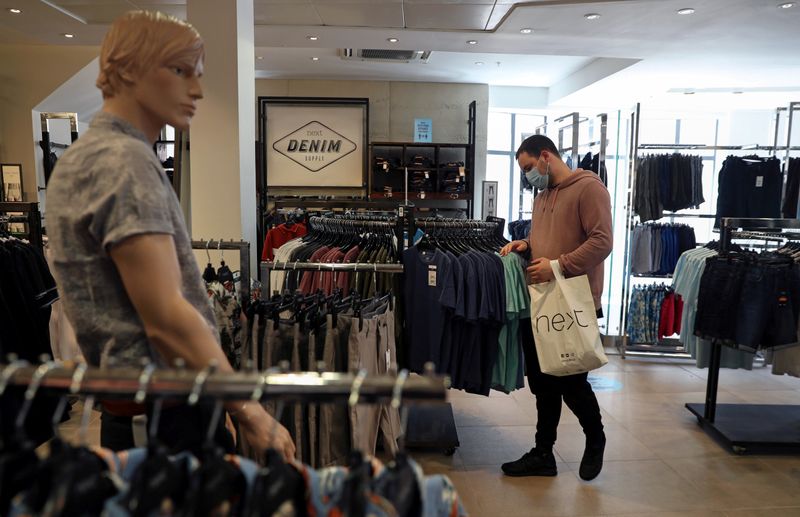
FILE PHOTO: A customer wears a protective face mask at a shop, following the coronavirus disease (COVID-19) outbreak, in Durham, Britain July 24, 2020. REUTERS/Lee Smith/File Photo
August 19, 2020
By Andy Bruce and David Milliken
LONDON (Reuters) – British inflation jumped unexpectedly last month to its highest since March, as clothes shops did not hold their usual summer sales when they reopened after the coronavirus lockdown, but most economists expect it to fall again soon.
Annual consumer price inflation rose to 1.0% in July from 0.6% in June, the Office for National Statistics said, above all forecasts in a Reuters poll of economists.
Most economists expect the rise to prove temporary — especially as the impact of the government’s “Eat Out to Help Out” restaurant discount kicks in during August.
ING said “the only way is down”. “While ongoing supply-chain disruption will inevitably cause price spikes in certain areas, the more dominant factor will be the widely predicted rise in unemployment,” ING economist James Smith said.
The consensus of economists polled by Reuters shows inflation remaining below the Bank of England’s 2% target at least until the end of next year.
Nonetheless two-year inflation-linked bonds <GBIL1S22=> priced in a higher rate of inflation at 2.675% on Wednesday, up from Tuesday’s four-week low of 2.629%.
These bonds use the RPI measure of inflation, which rose to 1.6% in July from 1.1%, and this figure will also be used to calculate next year’s annual increase in rail fares.
Clothing and footwear prices were the biggest contributor to the rise in inflation in July, the ONS said.
In most years retailers slash clothes prices between June and July to clear out their summer ranges in preparation for autumn.
This year, the drop in clothing and footwear prices was unusually small, perhaps reflecting discounting early in lockdown.
Higher petrol prices – and greater costs for haircuts, dentistry and physiotherapy – also contributed to higher inflation, the ONS said.
“Prices for private dental treatment, physiotherapy and haircuts have increased with the need for PPE (personal protective equipment) contributing to costs for these businesses,” ONS Deputy National Statistician Jonathan Athow said.
Haircuts and other personal grooming cost 5.1% more than a year before.
Core inflation – which excludes typically volatile energy, food, alcohol and tobacco prices – rose to its highest in a year at 1.8% from June’s 1.4%, versus expectations for a small fall.
The ONS said July’s inflation number was based on near-complete coverage of its standard basket of goods and services, after widespread unavailability of some services at the start of the lockdown.
The Bank of England said earlier this month it expected inflation to turn briefly negative in the near-term, falling to -0.3% in August.
(This story corrects June RPI to 1.1% from 1.2%.)
(Reporting by Andy Bruce and David Milliken; Editing by Alex Richardson and Alison Williams)

